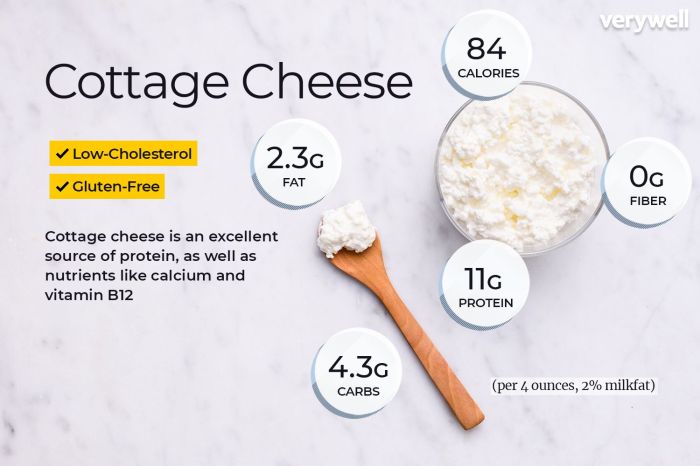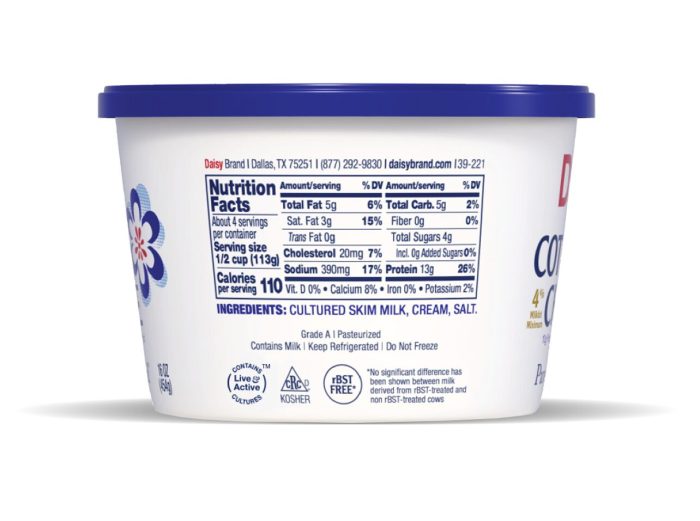Nutritional Composition of 100g Cottage Cheese

Cottage cheese nutrition facts 100g – Cottage cheese offers a valuable nutritional profile, making it a popular choice for those seeking a protein-rich and relatively low-fat dairy option. The specific nutritional content can vary slightly depending on the fat content (low-fat, part-skim, or whole milk) and manufacturing processes. The following analysis presents an average composition for 100g of low-fat cottage cheese.
Thinking about cottage cheese nutrition facts 100g? Well, to understand that fully, it’s helpful to grasp the broader picture first. You can check out this informative article on 4 cottage cheese nutrition facts for a solid foundation. After reviewing those key points, you’ll be better equipped to analyze the specifics of cottage cheese nutrition facts per 100g, making informed choices about your diet.
Macronutrient Composition of 100g Cottage Cheese
Cottage cheese is primarily composed of protein, carbohydrates, and fat. The ratio of these macronutrients significantly impacts its overall nutritional value and suitability for various dietary needs. The protein content is particularly noteworthy, contributing to its satiety and muscle-building properties.
| Macronutrient | Amount (grams) | Percentage of Daily Value (DV)* |
|---|---|---|
| Protein | 28 | ~56% (based on a 2000 calorie diet) |
| Carbohydrates | 4 | ~1% (based on a 2000 calorie diet) |
| Fat | 1 | ~2% (based on a 2000 calorie diet) |
Daily Value percentages are estimates and can vary based on individual dietary needs and calorie intake.
Micronutrient Content of 100g Cottage Cheese, Cottage cheese nutrition facts 100g
Beyond macronutrients, cottage cheese provides several essential micronutrients, contributing to overall health and well-being. These micronutrients play crucial roles in various bodily functions, from bone health to immune function.
| Micronutrient | Amount (mg or mcg) |
|---|---|
| Calcium | 100-150 |
| Riboflavin (B2) | 0.2-0.4 |
| Vitamin B12 | 0.5-1.0 |
| Phosphorus | 150-200 |
| Selenium | 5-10 |
Note: Values may vary depending on the specific brand and manufacturing process. These figures represent typical ranges found in low-fat cottage cheese.
Fat Composition and Health Implications
The fat content in cottage cheese is relatively low, particularly in low-fat varieties. The majority of the fat present is saturated fat, which, in excessive amounts, has been linked to increased cholesterol levels. However, the overall fat content in a serving of cottage cheese is generally not considered a major health concern, especially when consumed as part of a balanced diet.
The presence of some saturated fat should be considered in context with overall dietary fat intake. The type of milk used (whole milk, skim milk, etc.) will significantly affect the fat content and composition.
Cottage Cheese and Dietary Needs: Cottage Cheese Nutrition Facts 100g
Cottage cheese offers a versatile and nutritious option for individuals seeking to incorporate high-protein, low-fat dairy into their diets. Its nutritional profile makes it suitable for various dietary approaches, particularly those emphasizing weight management and specific macronutrient targets. Understanding its role within different dietary contexts allows for informed choices regarding its inclusion in personalized meal plans.Cottage cheese’s suitability for diverse dietary needs stems from its favorable macronutrient composition.
It is a relatively low-carbohydrate food, making it a suitable choice for low-carbohydrate diets such as ketogenic or Atkins diets. Conversely, its high protein content makes it beneficial for high-protein diets aimed at muscle building or weight management. The low-fat varieties contribute to a lower overall calorie intake, making it an asset in calorie-controlled diets.
Comparison of Cottage Cheese with Other High-Protein Dairy Products
Cottage cheese, Greek yogurt, and ricotta cheese are all popular high-protein dairy options. However, their nutritional profiles differ. Cottage cheese generally has a lower fat content compared to whole milk ricotta cheese, and a slightly lower protein content than Greek yogurt per 100g serving. Greek yogurt typically boasts a higher protein content, while ricotta cheese often contains a higher fat content.
The choice between these dairy products depends on individual dietary preferences and macronutrient goals. For example, an individual focusing on maximizing protein intake might choose Greek yogurt, while someone prioritizing lower fat might opt for low-fat cottage cheese.
Cottage Cheese and Weight Management
Incorporating cottage cheese into weight management strategies can be beneficial due to its high protein content and relatively low calorie density. Protein promotes satiety, helping to reduce overall calorie intake by keeping individuals feeling fuller for longer periods. This can be particularly helpful in managing appetite and preventing overeating. Furthermore, the protein in cottage cheese supports muscle mass maintenance, which is crucial for boosting metabolism and facilitating weight loss or maintenance.
Studies have shown that higher protein intake is associated with increased satiety and improved weight management outcomes.
Incorporating Cottage Cheese into Meal Plans
Cottage cheese’s versatility allows for its seamless integration into various meal plans throughout the day.
- Breakfast: Cottage cheese can be combined with fruits (berries, bananas), nuts, and seeds for a nutritious and filling breakfast. It can also be used as a base for savory breakfast dishes.
- Lunch: Cottage cheese can be incorporated into salads, sandwiches, or served as a side dish with vegetables.
- Dinner: Cottage cheese can be added to casseroles, used as a topping for baked potatoes, or included in various savory dishes.
- Snacks: Cottage cheese can be enjoyed on its own or paired with fruits, vegetables, or a small amount of whole-grain crackers for a healthy and satisfying snack.
Variations in Cottage Cheese Nutritional Content

Cottage cheese, a versatile dairy product, exhibits variations in its nutritional profile depending on several factors. Understanding these differences is crucial for consumers seeking to make informed choices aligned with their dietary needs and preferences. This section will explore the nutritional disparities between various cottage cheese types and the factors contributing to these variations.The nutritional content of cottage cheese is primarily influenced by the type of milk used in its production, the processing methods employed, and the addition of any ingredients.
These factors collectively impact the fat content, protein content, carbohydrate content, and overall calorie count.
Nutritional Differences Between Cottage Cheese Types
Different types of cottage cheese, such as low-fat, whole milk, and organic, present distinct nutritional compositions. Whole milk cottage cheese typically contains higher levels of fat and calories compared to low-fat varieties. Organic cottage cheese, while potentially offering similar macronutrient profiles to its conventional counterparts, may differ slightly depending on the farming practices and feed given to the cows.
For example, a 100g serving of whole milk cottage cheese might contain approximately 10g of fat and 200 calories, whereas a low-fat version might contain only 2g of fat and 100 calories. The protein content usually remains relatively consistent across varieties, generally ranging between 10-12g per 100g serving.
Factors Influencing Nutritional Content Variations
Several factors contribute to the variability observed in cottage cheese’s nutritional composition. The type of milk used is paramount; whole milk inherently contains more fat and calories than skim milk, directly influencing the final product’s nutritional profile. Processing methods also play a role. The curdling process and subsequent whey separation can affect the final texture and nutrient retention.
Added ingredients, such as salt or fruit, further modify the nutritional values. For instance, adding fruit increases the carbohydrate content and potentially the sugar content.
Interpreting Cottage Cheese Nutrition Labels
Careful examination of nutrition labels is essential for making informed decisions. Pay close attention to the serving size, as nutritional values are presented per serving. Compare the fat, protein, and carbohydrate content per serving across different brands and varieties. Check for added sugars, sodium content, and any other ingredients that may influence your dietary choices. For example, a label clearly stating “low-fat” indicates a reduced fat content compared to whole milk versions.
Comparing labels from different brands allows consumers to identify products that best meet their individual nutritional needs and preferences. Understanding the nutritional information empowers consumers to select the cottage cheese variety that aligns with their specific dietary goals and health objectives.
Questions and Answers
What are the best brands of cottage cheese to choose for optimal nutrition?
Nutritional content can vary between brands due to factors like milk source and processing. Look for brands with minimal added ingredients and check the nutrition label for sodium and fat content to make an informed choice based on personal dietary needs.
Can cottage cheese be part of a vegan diet?
No, traditional cottage cheese is a dairy product and therefore not suitable for a vegan diet. However, there are some plant-based alternatives available that mimic the texture and some nutritional aspects of cottage cheese.
How can I reduce the sodium content in my cottage cheese?
Choose low-sodium or reduced-sodium varieties of cottage cheese. You can also rinse the cottage cheese under cold water to help remove some of the sodium.
Is cottage cheese suitable for people with diabetes?
Cottage cheese can be part of a diabetic diet, but portion control is essential due to its carbohydrate content. Choose low-fat options and incorporate it into a balanced meal plan with other diabetes-friendly foods.
